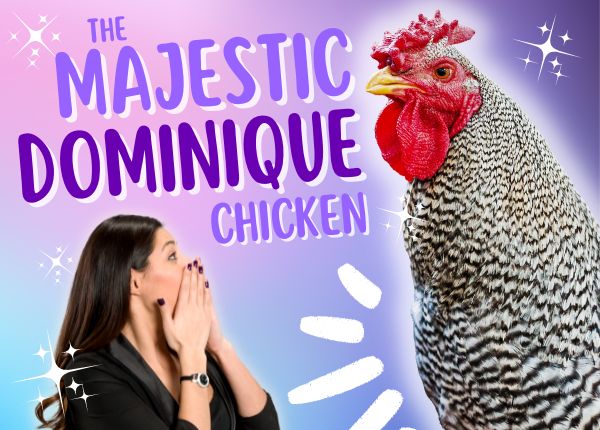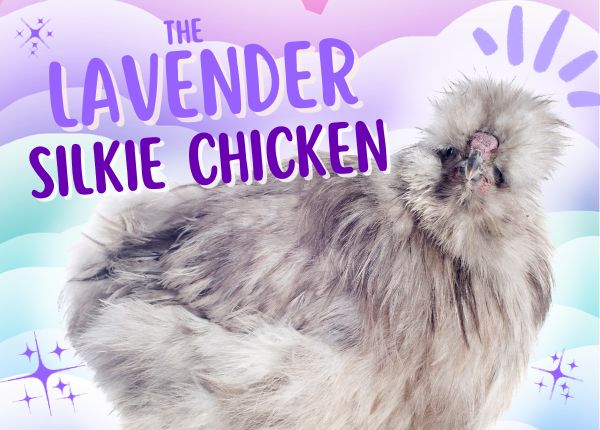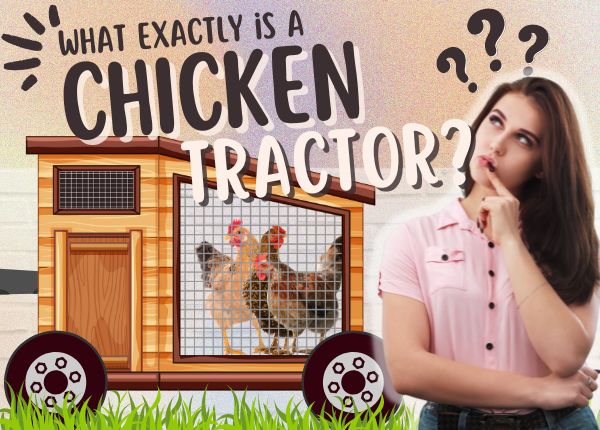
Great things always stand the test of time, and as the oldest breed of chicken in the US, Dominique chickens prove that point perfectly. We still love these barcode-brandishing beauties! Here’s why:
Dominique chickens are the perfect poultry combination of strength and softness. They’re hardy, healthy, self-sufficient, and capable chickens that also make friendly pets, great mommas, lay well, and have the softest feathers imaginable. They’re practically perfect if you’re new to keeping poultry.
They first set their little yellow feet in America way back in the 1620s. You can’t be around for that long and not pick up a few nicknames along the way. Brace yourself!
Dominiques, Dominickers, Doms, Pilgrim Fowl, Puritan Fowl, Plymouth County Fowl, American Game Fowl, Blue Spotted Hens, Old Gray Hens, or - my least favorite of the lot - Dunghill Fowl, are all the same chickens! Whatever you choose to call them, they are brilliant beginner-friendly birds.
If these chickens could speak, I’ve no doubt they’d have lots of wise old anecdotes to share about life ‘back in the olden days’. The Dominique was around long before cozy coops, feeders filled with chicken feed, or vets and vaccinations. They know how to forage, dodge predation, stay warm, raise their babies, and fend for themselves.
Dominiques are as tough as old boots, but they’re big softies too. Their feathers are so soft that they’re one of the most popular choices for pillow stuffing. They have calm and contented temperaments, they don’t mind a hug from their humans, and they make caring and successful mommas and papas. Even the roos are polite with people whilst fiercely defensive of their feathery families.
Dominiques have a long and rather dramatic history, but cluckily they have a bright future ahead of them with the increased interest in keeping hardy and productive homestead hens.
After a frightfully close shave as a critically endangered breed in the early seventies they are still on the watch list, but with a little more eggs-posure, this heritage hen will be ruling the roost again in no time.
You’re just a speedy read away from knowing everything you need to about this barred breed: what they’re like to keep, where they came from, what they’re good for, and whether they’re right for you.
Taking the time to learn about breeds before you bring them home will hugely improve how well your chicken journey goes, and the health and happiness of the chickens that you’re caring for.
Check out Chickenpedia’s expert courses on all things chicken! You’ll learn things you didn’t know you needed to. Everything is covered in easy-to-read terms: from coops to coccidiosis, bumblefoot to bantams, and giant breeds to go-to guides.
MEET THE DOMINIQUE

What Are Dominique Chickens Like?
Dominique chickens are calm, collected, relaxed, and approachable. They’re happy to be handled but also very self-sufficient. They’re hardy and alert enough to do well free ranging. They much prefer to find their own bugs 🐛 and grubs than have supper served up in a feeder for them, making them a frugal choice of fowl.
“Dominique chickens are generally calm, a gentle breed that makes for a good choice for raising free range chickens because of their barred feather pattern that is thought to offer some protection from aerial predators.” (Cackle Hatchery)
Are Dominiques the Same as Barred Rocks?
Dominiques are a different breed of chicken than Barred Rocks, but that wasn’t always the case!
Barred Rocks (or Plymouth Rocks) descended from Dominiques. When Barred Rocks were first developed the two used to be considered different strains or varieties of the same breed, until unique breed standards were pinned down to avoid confusion in 1870.
Even the experts at the poultry shows struggled to tell them apart, so you’re totally forgiven if you get them confused.
Read all about the Barred Plymouth Rock here!
Dominique or Barred Rock?
There are a few fowl-proof ways to tell these two breeds apart:
Dominique chickens have a rose comb and barred Rock chickens have a single comb.

Dominique chickens have a staggered cuckoo pattern rather than the distinct stripes of the barred rock
Dominique chickens have dark grey and off-white feathers, rather than the crisp black and white colors shown in the barred rock
Dominique chickens have longer tails than Barred Rocks
“The Barred Rock has a single comb (straight comb) and more of a straight pattern in the barred feathers. The Dominique chicken has a rose comb and a slight v pattern in the barring of the feathers. Both make for good chickens in the winter and good pet chickens.”(Cackle Hatchery)
Are Dominiques the Same as Amrocks?
Amrocks and Dominiques are also different chicken breeds. Amrocks (American rock chickens) are the European version of the Barred Plymouth Rock, also bred from the Dominique.
Just like the Dominique, the Amrock is only found in the cuckoo (or barred) coloration, as they all share the same gene that causes barring in feathers. As the Europeans wanted a heavier chicken for meat production, Amrocks are a little larger than barred rocks.
Are Dominiques the oldest American chicken breed?
The exact details about who delivered the Dominique chicken to US shores remain up for debate, but it’s commonly accepted that they are indeed the oldest recorded breed of chicken in the US.
Where Did Dominiques come from?
These chickens go by many names, but the most popular picks are Pilgrim Fowl and the Dominique.
It’s thought that their distant ancestors originated from the Island of San Domingo, hence the name Dominique.
It’s the most accepted theory that pilgrims from Southern England brought chickens similar to the Dorking or Sussex with them into the US during their original settlement. The Dominique would have been developed by the pilgrims, hence the name Pilgrim Fowl. These chickens would have been invaluable as a food source during those tough colonial years.
“(They) were well known by about 1750, and by the mid-nineteenth century were widely distributed in the eastern United States.”(Wikipedia)
The Dominque was then crossbred with various other chickens as the years went by, and the most popular descendant by far is the infamous Plymouth rock. For some time, the lines were blurred about what defined a Dominque or a Plymouth rock, but in 1870 it was decided that if the chicken in question had a rose comb then they were a Dominique, a single upright comb and they were a Plymouth Rock.
“…thought to derive from birds brought to America by colonists from southern England. It was well known by about 1750, and by the mid-nineteenth century was widely distributed in the eastern United States.[9]: 429 [5]: 53 It is a dual-purpose breed but is kept principally for its brown eggs.[9]: 429 It became an endangered breed in the twentieth century, but numbers have since recovered.” (Wikipedia)
Are Dominique Chickens Rare?
Dominiques are no longer rare, but they are sadly on the watch list.
The Dominique’s descendant – the Plymouth Rock - stole the limelight from its predecessor in 1875 and Dominique numbers soon started to fall. In fact, they plummeted. By 1970 only four flocks of the Dominique chicken were known to remain. They were well and truly endangered, and their status was officially registered as critical with the Livestock Conservancy.
We owe a huge thank you to the dedicated flock owners of these remaining chickens, who took it upon themselves to start a breed rescue program. They nailed it, and the Dominique breed has found its way back from the brink.
Cluckily, Dominiques are out of immediate danger, but let’s keep it that way! They’re still living in the shadow of their more modern descendants, the Barred Plymouth rocks, who are enjoying being one of the most popular breeds in the US.
I think we’ve room in our hearts and homesteads for both breeds.
KEEPING DOMINIQUE CHICKENS
Are Dominique Chickens Suitable for Beginners?
Dominique chickens are a brilliant choice for beginners. They are very happy left to free range and forage for their food. You needn’t face any guilty feelings about leaving them to it since they prefer it that way. They’re savvy enough to minimize predation risk during the day, and they’re hardy and healthy enough to go bug hunting in the cold.
As well as being utterly undemanding, they’re also easy to handle, so those health checks are less daunting than they can be with less amenable breeds.
Eggs are easy to come by, and if you’re a beginner breeder they make great mommas, so you won’t have to delve into the world of incubators or adoptive momma hens with this breed.
Are Dominiques Friendly?
Dominiques are friendly and will happily perch on your head or let you scoop them up and handle them. They don’t tend to sit on their owners’ laps for a fuss and a cuddle but will form a bond and be open to some affection.
Which Chicken Breed Can I Keep with Dominiques?
Dominiques are friendly with each other and other chicken breeds too. They’re happy to shack up with other like-minded, chilled-out chicken breeds like Orpingtons, Brahmas, Welsummers, and Cochins. Bossier breeds are likely to take advantage of your Dominique’s kind nature and may bully them a bit, so you need to be cautious with your pairings.
Knowing which chicken breeds to keep together can feel like a minefield. Different breeds require different chicken feed, climates, and coop designs and features. They all have different temperaments, and whilst personality always plays a part, breed knowledge can avoid unnecessary trauma.
Just click on Chickenpedia before you decide on a breed to introduce to a new or existing flock. It’s a quick and easy route to reliable, expert, practical advice to help you build your perfect feathery family. You’ll be able to find out which breeds suit your needs, which breeds to keep together, and how to care for them all whilst enjoying the experience.
Dominique Chicken Eggs

Dominique hens lay 4 eggs 🥚 a week on average. That’s around 230 – 270 eggs a year. She’s one of the best! One of the best. Hens mature quickly and will usually start laying at around 21 to 24 weeks.
Dominique eggs are medium to large-sized and light brown. They’re usually just on the edge of the two sizing standards, weighing 55-60 grams.
“They lay well for the first two years, but after this production will usually begin to fall year-on-year at a rate of approximately 10% per year.” (Cackle Hatchery)
Are Dominique Chickens Expensive to Keep?
Dominiques are a frugal choice of fowl. They’re so self-sufficient that they prefer to find their food rather than have it dished up to them, so feed costs are minimal if you have the capacity and space to let them roam free.
They’re also hardy and have no specific health issues, meaning that vet bills are usually minimal.
Since they’re predator savvy, they don’t need expensive or extravagant enclosures, but that doesn’t mean you shouldn’t keep an eye on them all the same!
Dominique Roosters Vs Hens:
Dominique chicks can be sexed very early on, so there’s no need to post half a dozen ‘he or she?’ photos on social media with this chicken breed.
Chicks mature and feather out faster than most breeds and soon show off their sex-linked coloration.
What are Dominique Chicks Like?
Dominique chicks are fabulously fluffy. They’re mostly black with a white spot on the top of the head. They also have some white on their wing tips and abdomens. They have yellow legs and feet.
Female Dominique chicks have much darker leg markings than males do. Females also have one very distinct white head spot, whilst the boys' head spots are more diffused.
Dominique chicks are very sociable and friendly. The adorable little Dom chicks will run up to your feet to say hello, so be warned that you will not be able to walk away empty-handed once you go to see them!
Are Dominique Hens Broody?
Dominique hens are excellent mums. They do go broody, which can be a good thing or a bad thing depending on what you want from your ladies, but if you do decide to raise a little Dominique family, then you’re not likely to have to intervene. A Momma Dominique hen will be delighted to sit on her eggs and dote over her babies. No incubator required!
Are Dominique Roosters Aggressive?

Just like their ladies, Dominique roosters have calm, friendly, and docile temperaments…unless they feel threatened. Roosters 🐔 will defend their hens and chicks fiercely if they need to.
They are most likely to show aggression during mating season, and when they’re in their cockerel prime at around six months old. There’s no need to worry though, as it’s all just a bit of teenage rivalry, and they don’t tend to turn this aggression toward their keepers.
Are Dominique Chickens Noisy?
Dominique chickens aren’t noisy in decibel terms, but they chat a lot. Just like any chicken, they’ll let you know how they feel about your presence, your choice of food treat, or the size of the egg they just laid. They’re not loud enough to be offensive to you – you love your chickens after all – but they’re probably not suited to a close-knit urban environment.
Dominique roosters are very defensive of their flocks. To me and you, that’s perfect, but this might be a tad annoying to your neighbors.
Since they prefer to be free-range, they’ll be mouthier when kept in confined, urban homes, and may well cause a neighborly dispute. Dominiques are better suited to homesteads with a bit of space.
Can Dominiques Be Kept Free Range?
Dominiques do best free ranging. They forage well, they’re alert, and their barred plumage works great as camouflage from aerial predators.
Are Dominiques Good Backyard Chickens?
Dominiques are hardy, friendly, happy free ranging but can cope well in confinement too. They’re great foragers, perfect pest control. They’re not demanding, they lay plenty of eggs all year around, and they’re friendly. There’s your answer. Dominiques are one of the best backyard chicken breeds.
However…they can be noisy, so the only thing to consider is how close you are to your neighbors.
How Much Space Do Dominique Chickens Need?
To keep your Dominique hens happy in their home you should allocate 3 squared feet per chicken and treat them to 12×12-inch nesting boxes in appreciation of all that hard work laying yummy brown eggs.
Dominique chickens are medium-sized birds. They’re happier hens when they’re allowed to roam free, but they can handle some confinement.
Do Dominique Chickens Fly?
Dominiques are quite heavy chickens, but they don’t let them stop them! Dominiques can - and will - fly.
It won’t be a graceful flight. I’d say more of a flappy, scrambly, run-hop-launch…but they’ll do it.
As Dominiques are quite alert they can spook easily to something new in their surroundings and will flap up into nearby trees to hide or roost. The Dominiques we’ve kept took any opportunity to flap up and perch on our heads, backs, or more annoyingly our cars.
Are Dominique Chickens Cold Hardy?
Dominique chickens are cold hardy. They have the bodies for it!
They have the perfect combination of close-knit feathers which lay close to their bodies and provide great insulation, clean legs, and a single comb which means they aren’t at risk of frostbite as much as fluffy chickens.
If you want to enjoy eggy bread on a cold winter’s morning, then you’ll need a hen who is happy to work throughout the winter months. Dominique hens will lay throughout the year.
How Long Do Dominique Chickens Live For?
Dominiques live for 6-8 years, or maybe longer if you lavish them with love.

Chickenpedia covers easy, affordable ways to make a huge difference to your chickens’ health. Take a beak here!
Dominique Chicken Pros & Cons
Heads up: this list will be a bit unbalanced. I’m making no apologies for it. There are just more pros than cons.

Reasons to keep Dominiques:
- Beginner Friendly
- They are so very very pretty!
- Mature early and lay well throughout the year
- Easy to sex
- Friendly and easy to handle
- Child friendly
- Comical and alert
- Cold hardy and healthy
- Thrive free-range but can tolerate confinement
- Self-sufficient and require minimal feed
- Good layers
- Excellent, broody mommas
Reasons not to keep Dominiques:
- Roosters can be aggressive if they feel they need to (though arguably, this is a positive thing).
- Whilst most hens are broody, they can be unpredictable as individuals
- Eggs are closer to medium than large and they’re not the best layers available
- Can be too chatty for an urban lifestyle
- Can be picked on by bossier chicken breeds
Should I Buy Dominique Chickens?
If you have the space, and you aren’t fussed about an uber-cuddly chicken, then I’m going to say yes. You should at least add them to your chicken wish list!
CAN WE MEET YOUR DOMINIQUES? ARE YOURS AS AWESOME AS OURS?
Chick Pics in the comments, please!
Are You Digging the Dominique?
Ever been thanked for reading an article? No? Well, just as the Dominique was the first American chicken, this can be your first official thank you for reading!
It’s madness that this heritage breed is on the watch list. There’s no reason why an awesome breed like the Dominique should have ever gone out of fashion, but with caring keepers like you taking the time to research breeds before they buy their birds, we hope we can avoid seeing them at risk again.
How to know which breed is right for you? Easy! Well, no, it isn’t easy at all, but the wise nuggets at Chickenpedia have found a way to make it feel that way! Their chicken breed course is the perfect way to explore all the different types of chicken available to you, and narrow down breeds by those most suited to beginners, backyards, smaller spaces, or colder climates.
You’ll find your perfect breed (although…it’s probably going to be the Dominique) in no time. OOooooohh, which chicks will it be? Egg-citing!











Leave a comment (all fields required)